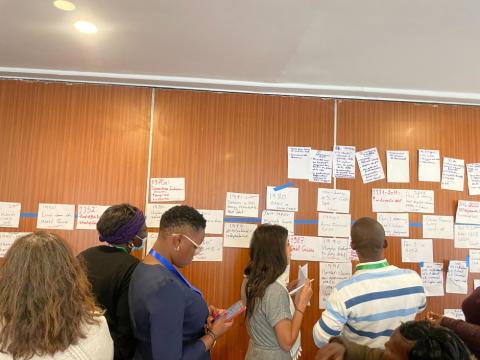
Human rights organizations in Africa deepen calls for debt cancellation and restructuring
In the face of debt crises across the African region and globally, during a regional strategy meeting held in Nairobi, Kenya (2-4 August 2022) human rights organizations called on the International Monetary Fund (IMF) to cancel the illegitimate debt and prioritize human rights and social protection in their plans and programs. ESCR-Net’s Economic Policy Working Group provided this space for its members in the African region to deepen the collective analysis of these debt crises, their histories and structural drivers, and the impacts on human rights while outlining alternatives and strategies for resistance.
During the meeting, ESCR-Net members built a timeline of debt to outline the unfair and onerous debts historically imposed on African countries, entrenched in colonial legacies of oppression and ongoing imperialism. They further raised the alarm over the constant imposition of neoliberal policy reforms by International Financial Institutions like the IMF and other private creditors amid debt crises that have exacerbated global inequalities, impoverishment and introduced structural changes that have weakened labor rights, undermined food sovereignty, promoted regressive taxation and imposed austerity on the majority, including cuts in public expenditures while promoting the privatization and commercialization of public services.
The organizations also expressed concern over the skyrocketing and unsustainable public debts facing countries in the region amid a devastating pandemic and distressed economies. A situation that has aggravated social, political, economic, and environmental crises in almost every context, increasing inequality, facilitating continued inaction on climate change, and imperiling human rights in the region.
Timeline of debt to outline the unfair and onerous debts

Key demands
Reflecting on the ESCR-Net’s Global Call to Action and the Public Statement of Demands to the IMF, the organizations reiterated their call for the cancellation of what they termed as “illegitimate debt”. They also discussed the need for transparent and accountable processes to restructure other debts, in which the IMF and creditor States prioritize the human rights of the majority over the narrow interests of their private creditors. They emphasized that this is critical for the recovery efforts, ensuring that States can redirect and prioritize their resources to address continuing health, economic, and wider human rights crises instead of focussing on debt repayment.
Members also called on the IMF to stop imposing conditionalities on borrowing countries and instead prioritize human rights and social protection in their plans and programs; model and support democratic governance structures that allow for transparency and participation, including more effective engagement with impacted communities and associated civil society organizations.
Next steps
Members will advance strategic advocacy and campaigning in key spaces, including the upcoming IMF/World Bank Annual Meetings and the Finance in Common Summit in October 2022. To support and be part of this ongoing advocacy and campaigning, members are developing a background document and a comic on debt and corporate capture, a political glossary of key terms related to debt, and a timeline of debt, drawing on events in member countries.
The Kenyan human rights organization, Pamoja Trust co-hosted this event with the Planning Committee, including Phenix Center, Institute for Social and Economic Rights (ISER), Muungano Wa Wanavijiji and the human rights activist and individual member Mela Chiponda, . Other human rights organizations in Africa were also present such as Arab NGO Network on Development (ANND), Global Initiative for Economic, Social and Cultural Rights (GI-ESCR), Center for Economic and Social Rights (CESR), Center for Human Rights and Development- Rwanda (CHRD), World Forum of Fisher People,(WFFP) Al Haq , Network Movement for Justice and Development (NMJD), African Resources Watch (AfreWatch), Egyptian Initiative for Personal Rights (EIPR), FIDA Uganda, Nairobi People’s Settlement Network (NPSN) and SEATINI from Uganda.
